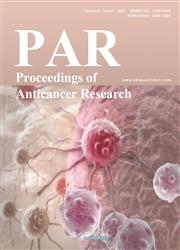Bioinformatics Analysis and Experimental Verification of Prognostic and Biological Significance of Autophagy-Related Long Non-Coding RNAs in Gastric Carcinoma
引用次数: 0
Abstract
Background: Long non-coding RNAs (lncRNAs) play a vital role in autophagy modulation and tumor progression. However, the key lncRNAs and their functions in gastric cancer (GC) remain largely unknown. Methods: A bioinformatic analysis of GC patients’ gene expression profiling data from the Cancer Genome Atlas database was performed to identify autophagy-related lncRNAs that are associated with predictive risk. Through Cox regression and Lasso regression analyses, the autophagy-related lncRNAs that are associated with prognosis were identified, and a novel prognostic model for GC was established. The model was then used to evaluate the clinical features and predictive risk of individuals with GC. By using two datasets, GSE 62254 (n = 300) and GSE 15459 (n = 192), from Gene Expression Omnibus, its effectiveness was verified. Gene set enrichment analysis according to hallmark and Kyoto Encyclopedia of Genes and Genomes were used to determine the possible biological roles of these lncRNAs. Furthermore, the HOXD antisense growth-associated long non-coding RNA (HAGLR) mechanism in GC was discovered through in vitro and in vivo experiments. Results: Six lncRNAs associated with autophagy in GC were identified, and a new prognostic risk model based on these lncRNAs was established. The six-lncRNA signature was significantly associated with adverse clinicopathological features and found to be an independent GC prognostic factor. The model was proven to be effective and robust by GSE62254 and GSE15459. According to gene set enrichment analysis, the six lncRNAs appeared to be tightly linked to autophagy-related and cancer-related mechanisms. HAGLR was also found to promote tumor growth by enhancing autophagy signaling in GC. Conclusion: A novel prognostic model integrating HAGLR that can effectively evaluate and predict the prognostic risk of GC patients was established. The results indicated that HAGLR promotes gastric cancer progression by enhancing autophagy and is anticipated to be a potential new target for the treatment of gastric cancer.胃癌自噬相关长链非编码rna对预后和生物学意义的生物信息学分析和实验验证
背景:长链非编码rna (lncRNAs)在自噬调节和肿瘤进展中起着至关重要的作用。然而,关键的lncrna及其在胃癌(GC)中的功能在很大程度上仍然未知。方法:对来自Cancer Genome Atlas数据库的GC患者基因表达谱数据进行生物信息学分析,以确定与预测风险相关的自噬相关lncrna。通过Cox回归和Lasso回归分析,鉴定出与预后相关的自噬相关lncrna,建立新的胃癌预后模型。然后使用该模型评估胃癌患者的临床特征和预测风险。利用Gene Expression Omnibus的GSE 62254 (n = 300)和GSE 15459 (n = 192)两个数据集验证了该方法的有效性。根据hallmark和京都基因与基因组百科全书进行基因集富集分析,以确定这些lncRNAs可能的生物学作用。此外,通过体外和体内实验发现了HOXD反义生长相关长链非编码RNA (HAGLR)在GC中的作用机制。结果:鉴定出6个与胃癌自噬相关的lncrna,并基于这些lncrna建立了新的预后风险模型。6 - lncrna标记与不良临床病理特征显著相关,是独立的GC预后因素。GSE62254和GSE15459验证了该模型的有效性和鲁棒性。根据基因集富集分析,这6个lncrna似乎与自噬相关和癌症相关机制密切相关。HAGLR还通过增强胃癌细胞的自噬信号来促进肿瘤生长。结论:建立了一种整合HAGLR的新型预后模型,可有效评估和预测胃癌患者的预后风险。结果表明,HAGLR通过增强自噬促进胃癌进展,有望成为治疗胃癌的潜在新靶点。
本文章由计算机程序翻译,如有差异,请以英文原文为准。
求助全文
约1分钟内获得全文
求助全文

 求助内容:
求助内容: 应助结果提醒方式:
应助结果提醒方式:


